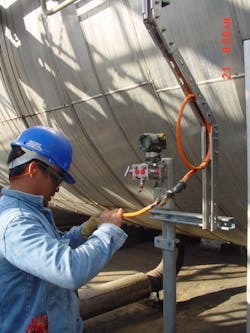Certified Training: More valuable than ever before
For many industrial manufacturers, digital automation technologies require increased training and education for plant personnel. These solutions offer many benefits and advantages to the user. However, they require not only an understanding of the technology but some differences in thinking about how to implement projects in order to ensure long-term success.
For example, specific aspects of FOUNDATION Fieldbus that bear close attention include wiring topology, power distribution, and general wiring practices such as grounding and shielding. Other considerations unique to fieldbus include function block residency, network bandwidth and scheduling, device address limitations, and overall system capacity. All of these areas have impact on project implementation, most notably on project scheduling itself. Tasks such as configuration and testing must be thought of differently than conventional control system projects.
Importance of certified instruction
When it comes to implementing digital technologies for industrial control projects, few engineers have more first-hand knowledge than David Lancaster, P.E., Certified FOUNDATION Fieldbus Instructor for Trine University in Angola, Indiana. He retired as the chief engineer for control systems for Bechtel Oil, Gas & Chemical Inc. in Houston, Texas, with over 44 years of experience in the industry.
“Too often, training is the first expense to go in a difficult economy.”
In Lancaster’s view, industrial plants make a mistake by not taking advantage of proper training opportunities. “The understanding of bus protocols and control system operation can be difficult – there is a lot of information, and you must understand how to read it and understand what it is telling you,” he said. “This affects startups and normal operation. A well-trained engineer can identify an issue and determine the correct solution very quickly.”
The FOUNDATION Certified Training Program (FCTP), established in 2007, defined uniform standards for FOUNDATION fieldbus educational curriculum around the world, as well as acceptable levels of learning for students of the technology. It was intended to enable the availability of thorough, comprehensive and accredited training to the process automation marketplace.
The FCTP was developed to ensure instructors delivering FOUNDATION fieldbus educational courses are skilled, knowledgeable and technically competent. Through certification, the program demonstrated to prospective end user students that fieldbus training centers, and their instructors, had been thoroughly evaluated based on strict criteria, and had the necessary qualifications to provide the very best training available.
The FieldComm Group’s certified training program will become even more valuable with the progress of digital technology. Reinstituted as the Field Communication Education Program (FCEP), the initiative will be expanded to include certified training opportunities for HART users. Together, FOUNDATION Fieldbus and HART are driving the digital transformation to smarter plant operations, made possible by the Industrial Internet of Things (IIoT) and Industry 4.0. Embedded in millions of intelligent devices and systems, they are enabling end users to make better and faster decisions, increase productivity, reduce costs, and minimize risk while raising the level of awareness of plant operations.
Institutions currently certified under the training program include: Fieldbus Center at Lee College, United States; Trine University, United States; SAIT Polytechnic, Canada; STC Brielle, The Netherlands; and IDX Academy, South Africa. Other training centers participating in the program include: Laboratory for Engineering of Application and Development of Control and Automation (LEAD), Brazil; Waseda Unversity, Japan; and King Mongkut’s Institute of Technology, Thailand.
Lancaster commented: "Effective and standardized training of plant personnel is the key to successful implementation of advanced technology. Process end users want to maximize the benefits of their instrumentation and control system investments, and experience has shown that training of operators, engineers and technicians is essential to getting the most out of technology."
The procedures that educational institutions must follow to gain certified training site status, together with certified course instructors and curricula, are rigorous. For example, certified training centers are required to maintain multiple hosts and devices onsite in order to display competence with the technology. They must also demonstrate to auditors that their course material adheres to set instructional standards covering segment limits; device replacements; commands, icons, menus and screen designs of different software packages; and communication, scheduling and function block assignments enabling configuration.
Additionally, certified instructors are audited to see if they have achieved specified FieldComm Group training goals. Instructors must demonstrate expertise in areas such as human-machine interface (HMI) tools, fieldbus troubleshooting, simple device configuration, and device deployment and functionality across a fieldbus network.
New methods of training delivery
The FieldComm Group’s training program currently offers four levels of certification: FOUNDATION Certified Professional, FOUNDATION Certified Support Specialist, FOUNDATION Certified Technical Specialist, and FOUNDATION Certified Physical Layer Installer. Other categories will be added with the inclusion of HART technology in the near future.
According to Lancaster, high levels of competition in the global industrial sector, coupled with the different learning needs of “Millennial” age employees entering the workforce, are driving new methods of fieldbus training. “At Trine University, we are offering hybrid courses where the lecture portion of the curriculum is online and can be completed according to the student’s schedule. It is then following by four days of intensive, hands-on instruction in our lab. This approach, which minimizes time away from the job, has been very successful for us.”
He continued, “Trine is also developing portable training units that can be taken to a plant site, enabling us to deliver certified training at the customer’s location.”
Lancaster encouraged the FieldComm Group to promote the availability of certified training, and believes certified training facilities must take a more active role in offering instruction to industry in their region. He also thinks educational institutions should stress the value of certified training to the companies they serve and emphasize the importance of a vendor-neutral training content.
For more information about certified training, visit the End User Training page on the FieldComm Group website.
About the Author
FieldComm Group
FieldComm Group

Leaders relevant to this article:


